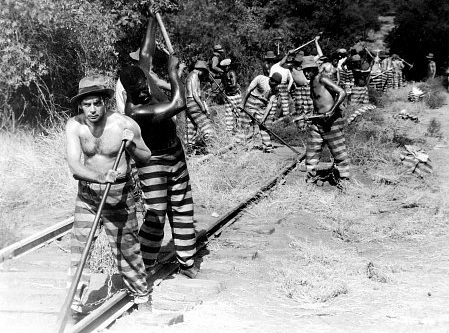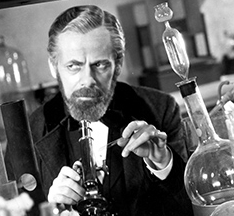
While the Warner Bros. studio was making a mint making gritty gangster pix in their 1930s heyday, they were also making "prestige" pictures with one chameleonic actor.
Paul Muni starred as a Mexican rebel leader and a French scientist, among other assignments that Cagney and Bogart would have killed for, if they weren't too busy killing other dirty little rats in Tommy-gun shootouts. Turner Classic Movies turns to Muni this Saturday night, starting with the movie for which he's most famous -- the more everyman crusade film I Am a Fugitive From a Chain Gang (Saturday at 8 p.m. ET, TCM).
I Am a Fugitive gets TCM's "Essentials" treatment because it's a riveting social commentary, circa 1932, on the unfortunate fate of too many World War veterans, "forgotten men," whose adjustment to home life in the jazz-age/pre-Depression '20s did not go so swimmingly. Warners would tackle this topic time and again (The Roaring Twenties, for one, with both Cagney and Bogart; Hollywood in this era had a much more clear-eyed view than post-WWII), but rarely assessed it with such brutal force as in Muni's pre-Code delivery into the ranks of the title prison hell. Fugitive has one of the movies' most famously haunting endings, and it's not to be missed.
Muni's historical "performances" feel less visceral, perhaps, because of all those expectations and all that makeup, pomp and circumstance. Juarez (Saturday at 10 p.m. ET, TCM) is a strange take on Mexico's battle against Napoleon that spends far more time with foreign interlopers Brian Aherne, Claude Rains and simpering princess Bette Davis (somebody sock this woman!) than with Muni's nearly mute local hero. The actor won the Oscar for 1935's  The Story of Louis Pasteur (Saturday late-night at 1:30 a.m. ET, TCM), biopic of the 19th century sterilization scientist. This one showcases Muni-the-emoter, whose intensity studio-era Hollywood adored.
The Story of Louis Pasteur (Saturday late-night at 1:30 a.m. ET, TCM), biopic of the 19th century sterilization scientist. This one showcases Muni-the-emoter, whose intensity studio-era Hollywood adored.
He's also a "crime doctor" in the '30s rackets tale Dr. Socrates (Saturday late-night at 12;15 a.m. ET, TCM), but then we get a later title that lets Muni simply be an actor becoming a character. His final film, 1959's The Last Angry Man (Saturday late-night 3 a.m. ET, TCM), casts him as an elderly Jewish doctor in Brooklyn whose good works get him attention from the kind of cynical media manipulators on whom the late '50s fixated (A Face in the Crowd, What Makes Sammy Run?, et al).
By this time, theater-trained Muni had returned to the New York stage (he'd actually started out in Yiddish theater), and won a Tony for the original staging of Inherit the Wind. But he's still best known as Warner Bros.' go-to "prestige" star. Find out why.
(By the way, Muni wasn't above gangstering. He's got more than one screw loose in Howard Hawks' original 1932 Scarface, another pre-Code demento-fest.)